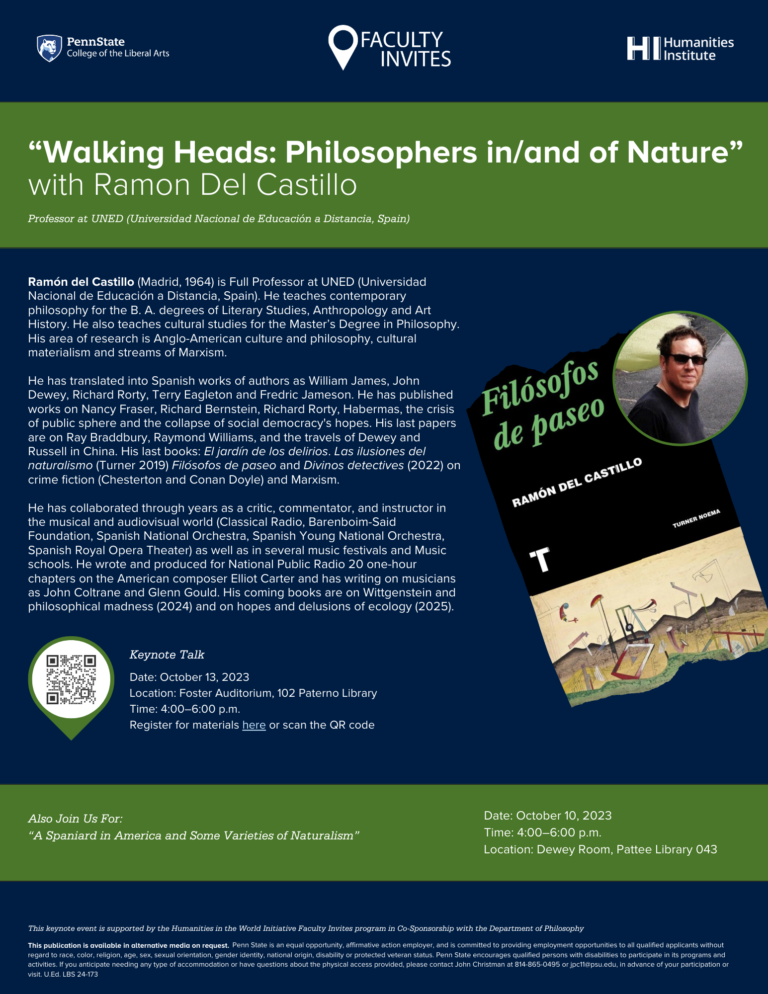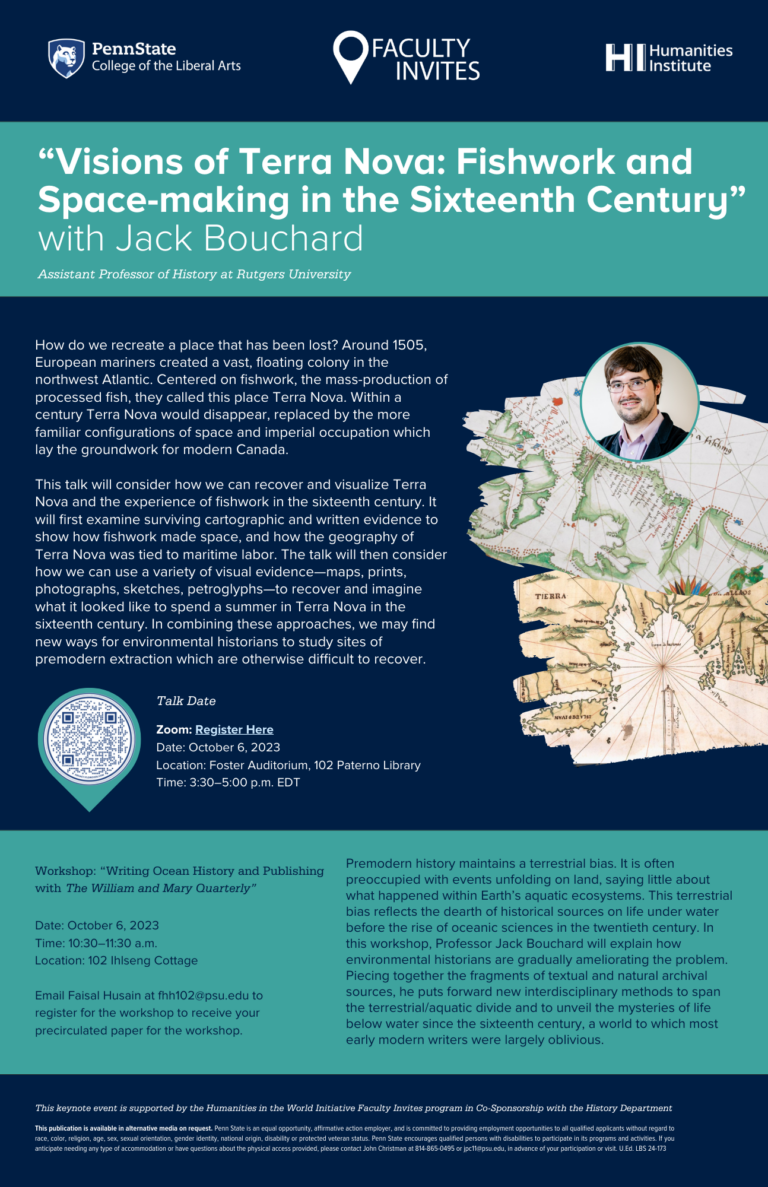2023-2024
Ramón Del Castillo
Professor at UNED (Universidad Nacional de Educación a Distancia, Spain)
Walking Heads: Philosophers in/and of Nature
Ramón del Castillo (Madrid, 1964) is Full Professor at UNED (Universidad Nacional de Educación a Distancia, Spain). He teaches contemporary philosophy for the B. A. degrees of Literary Studies, Anthropology and Art History. He also teaches cultural studies for the Master’s Degree in Philosophy. His area of research is Anglo-American culture and philosophy, cultural materialism and streams of Marxism. He has translated into Spanish works of authors as William James, John Dewey, Richard Rorty, Terry Eagleton and Fredric Jameson. He has published works on Nancy Fraser, Richard Bernstein, Richard Rorty, Habermas, the crisis of public sphere and the collapse of social democracy’s hopes. His last papers are on Ray Braddbury, Raymond Williams, and the travels of Dewey and Russell in China. His last books: El jardín de los delirios. Las ilusiones del naturalismo (Turner 2019) Filósofos de paseo and Divinos detectives (2022) on crime fiction (Chesterton and Conan Doyle) and Marxism. He has collaborated trough years as a critic, commentator, and instructor in the musical and audiovisual world (Classical Radio, Barenboim-Said Foundation, Spanish National Orchestra, Spanish Young National Orchestra, Spanish Royal Opera Theater) as well as in several music festivals and Music schools. He wrote and produced for National Public Radio 20 one-hour chapters on the American composer Elliot Carter and has writing on musicians as John Coltrane and Glenn Gould. His coming books are on Wittgenstein and philosophical madness (2024) and on hopes and delusions of ecology (2025)
Overview Description
In these two sessions I’d like to explain how and why I had the need to write two books related with visions of Nature. I will tell a little about my relationship with the city and the countryside, and some experiences in Nature, a world that as a child I first discovered in the cinema and only then in reality. I will also explain why some people have always lived nature and culture as two inseparable areas and that all this has to do with class differences. I will tell you some of my wanderings through the American landscapes.
Keynote Event: Walking Heads: Philosophers in/and of Nature
Friday, October 13th at 4:00-6:00 p.m. Foster Auditorium, 102 Paterno Library
In this session, we will concentrate on the second book, Filósofos de paseo, which could also be titled Philosophers wandering, or Philosophers in the open air, or also Walking heads and that is a somewhat controversial story that illustrates the comings and goings of philosophers through different spaces: gardens, parks, countryside, woods and mountains. My book can be understood as a supplement to Rebecca Solnit’s master work, Wanderlust, and studies the visions of nature of great philosophers through less-known or marginal w of their writings. We will discover, for example, some secrets that architects have revealed about Heidegger in the woods, but also why Sartre was nauseated by nature, while Simone de Beauvoir loved the sea, light, sky and water, and more. Or also why Hegel and Adorno were unable to conceive such a fantasy as “pure Nature”.
Talk Event: A Spaniard in America and Some Varieties of Naturalism
Friday, October 10th at 4:00-6:00 p.m. Dewey Room, Pattee Library 043
I will focus on Jardín de los delirios (2019) which title evokes El Bosco’s Garden of Delights, substituting delirium for delight, and whose subtitle (las ilusiones del naturalism) also deliberately plays with the ambiguity of the Spanish word “ilusión” which means both “illusion” and “delusion”. The objective of my book was to dismantle some preconceptions about naturalistic landscape architecture that has become fashionable in recent years, but I also analyzed ideas as rewilding and re-naturalization y and its connections with different conceptions of ecology. I will also explain why I adhered to the ideas of some geographers and philosophers who polemically claimed that “Nature does not exist” such as Slavoj Žižek or Erik Swyngedouw, who argues: “There is no such thing as a singular Nature around which an environmentally and socially just politics can be constructed and performed. Rather, there are a multitude of natures and a multitude of existing, possible or practical socio-natural relations” […] “The focus on a singular Nature that requires ‘sustaining’ or, at least, ‘managing’, is sustained by a particular ‘quilting’ of Nature that forecloses asking political questions about immediately and really possible alternative socio-natural arrangements.”
Jack Bouchard
Assistant Professor of History at Rutgers University
Visions of Terra Nova: Fishwork and Space-making in the Sixteenth Century
Keynote Event:
Friday, October 6th at 3:30-5:30 pm Foster Auditorium, 102 Paterno Library
How do we recreate a place that has been lost? Around 1505, European mariners created a vast, floating colony in the northwest Atlantic. Centered on fishwork, the mass-production of processed fish, they called this place Terra Nova. Within a century Terra Nova would disappear, replaced by the more familiar configurations of space and imperial occupation which lay the groundwork for modern Canada. This talk will consider how we can recover and visualize Terra Nova and the experience of fishwork in the sixteenth century. It will first examine surviving cartographic and written evidence to show how fishwork made space, and how the geography of Terra Nova was tied to maritime labour. The talk will then consider how we can use a variety of visual evidence – maps, prints, photographs, sketches, petroglyphs – to recover and imagine what it looked like to spend a summer in Terra Nova in the sixteenth century. In combining these approaches, we may find new ways for environmental historians to study sites of premodern extraction which are otherwise difficult to recover.
This keynote event is supported by the Humanities in the World Initiative Faculty Invites program and co-sponsored by the History Department.
Workshop:
Writing Ocean History & Publishing with The William and Mary Quarterly
Friday, October 6th at 10:30- 11:30 a.m. 102 Ihlseng Cottage
Pre-modern history maintains a terrestrial bias. It is often preoccupied with events unfolding on land, saying little about what happened within Earth’s aquatic ecosystems. This terrestrial bias reflects the dearth of historical sources on life under water before the rise of oceanic sciences in the twentieth century. In this workshop, Professor Jack Bouchard will explain how environmental historians are gradually ameliorating the problem. Piecing together the fragments of textual and natural archival sources, he puts forward new interdisciplinary methods to span the terrestrial/aquatic divide and to unveil the mysteries of life below water since the sixteenth century, a world to which most early modern writers were largely oblivious.
Registration is required for this workshop. Email Faisal Husain at fhh102@psu.edu to register.
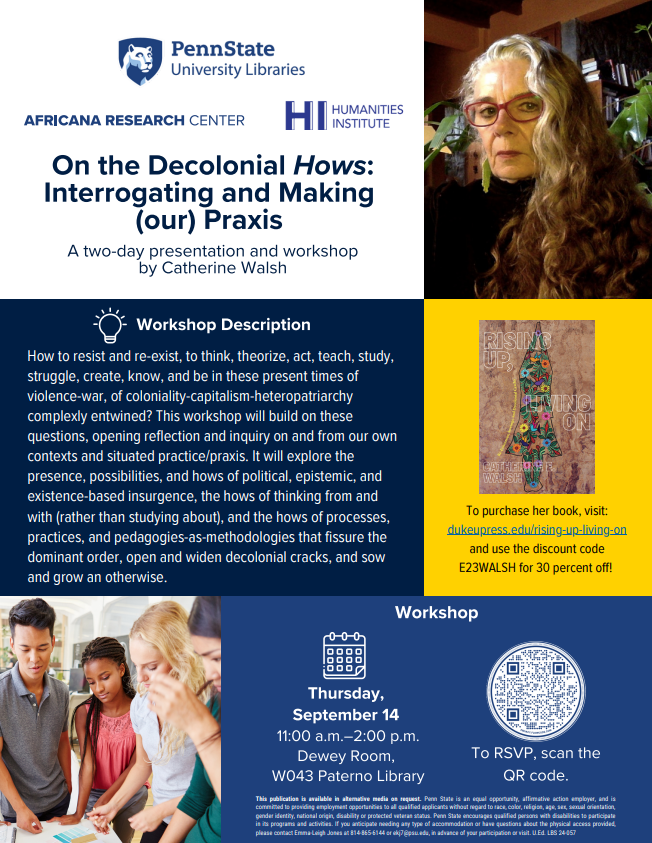
Catherine Walsh
“Rising Up, Living On”
Presentation:
Wednesday, September 13 at 4:30-6:00 pm. Foster Auditorium, 102 Paterno Library
A talk based on Catherine Walsh’s new book Rising Up, Living On.
Educator and intellectual-militant long involved in processes of social and decolonial transformation. In the US, she worked closely with Latin American, Caribbean, Asian and African communities and taught at the University of Massachusetts (1984-1995). Over the last 3 decades, she has accompanied struggles throughout Latin American, including Ecuadorian Indigenous and Black social movements at their request, and until her recent retirement, was professor, director of the doctoral program in Latin American Cultural Studies at the Universidad Andina Simón Bolivar-Ecuador, and coordinator of the Afro-Andean Documentary Fund, the largest archive of Black collective memory in Latin America. She has been an invited professor and speaker in five continents, and is the author of more than 300 publications in various languages.
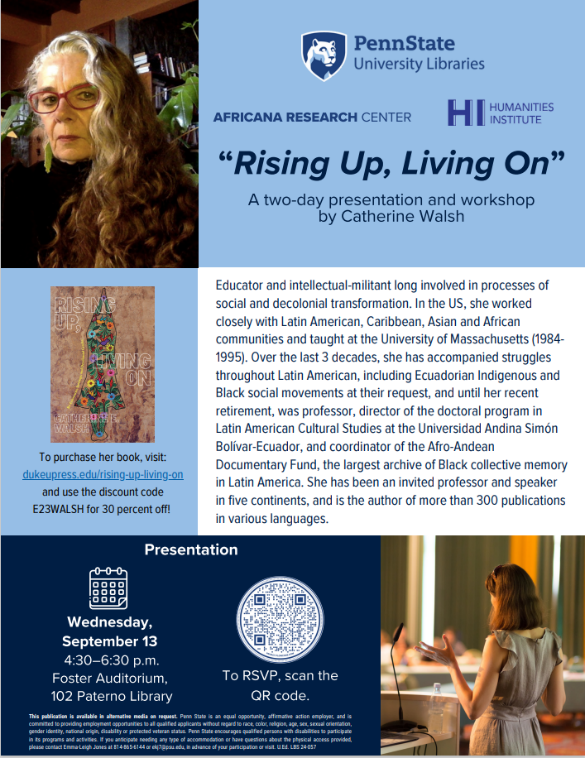
Workshop:
On the Decolonial Hows: Interrogating and Making (our) Praxis
Thursday, September 14 11:00-2:00pm. Dewey Room, W043 Paterno Library.
How to resist and re-exist, to think, theorize, act, teach, study, struggle, create, know, and be in these present times of violence-war, of coloniality-capitalism-heteropatriarchy complexly entwined? This workshop will build on these questions, opening reflection and inquiry on and from our own contexts and situated practice/praxis. It will explore the presence, possibilities, and hows of political, epistemic, and existence-based insurgence, the hows of thinking from and with (rather than studying about), and the hows of processes, practices, and pedagogies-as-methodologies that fissure the dominant order, open and widen decolonial cracks, and sow and grow an otherwise.

APLNG Roundtable Talk and Reception:
“Decolonial Weavings of Language, Memory, Life”
Friday, September 15 2:30- 4:00pm. 117 Earth and Engineering Science Building.
In this interactive talk, Catherine will share her involvement over four decades with struggles in the Americas against the coloniality of language and for decolonial weavings of language, memory, life.
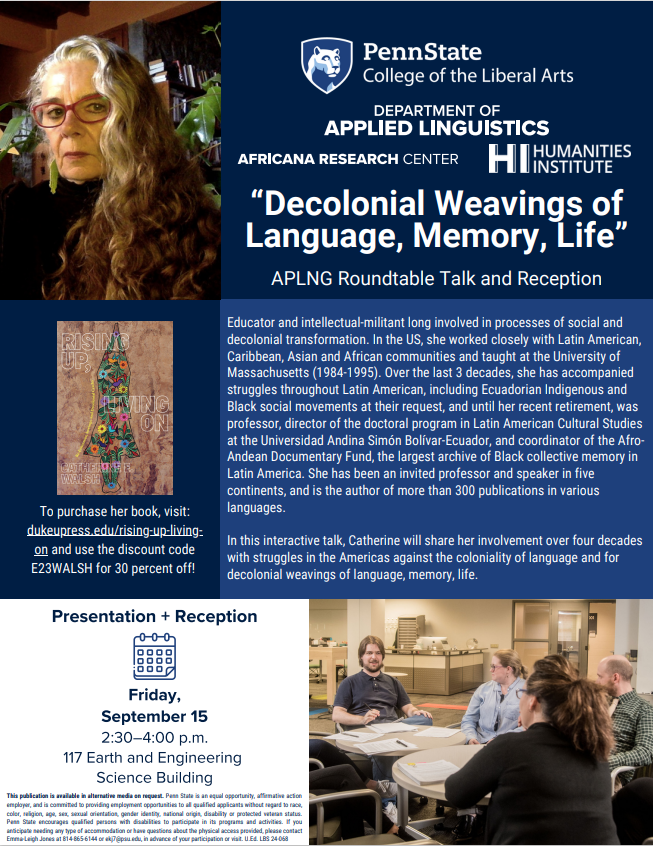
2022-2023
Intellectuals and decolonization in Palestine/Israel
April 15-17, 2023
Organizer: Tamir Sorek (Department of History)
Aside from being a territorial dispute, the Palestinian-Israeli conflict has also generated a struggle of ideas and visions, promoted by intellectuals: influential individuals equipped with access to the media and rhetoric skills. Scholars, journalists, authors, poets, artists, and other public figures have taken part in producing, articulating, and disseminating ideas about the conflict. Thus, intellectuals were no passive observers nor detached interpreters. They produced conceptual and poetic vocabularies that motivated and mobilized the Zionist settler-community and articulated their emerging collective identity; They galvanized Palestinian opposition to Zionism and a set of shared symbols for a shattered community; Functioning as “unofficial diplomats,” they participated in the struggle over public opinion abroad, a sphere which has been considered by both sides as crucial for their cause; and they raised internal criticism of their respective national communities and leadership, sometimes speaking in the name of universalist values.
In 2023, the political journey toward justice, freedom, and peace in Palestine/Israel seems to reach an impasse. For Palestinians, seventy-five years after the mass expulsion in 1948 and decades of political subjugation and continuous dispossession, the various tools of struggle they have developed over the years do not seem to produce a tangible achievement. Armed struggle, political negotiations, or the attempt to mobilize international pressure on Israel through non-violent moralistic means have all failed to restore and secure political rights. Furthermore, none of the political visions which have been suggested to replace the colonial condition – a two-state solution, a single democratic republic, or a confederation, seems to have a realistic likelihood to materialize soon. Under these circumstances, the future of Palestinians and Israelis depends on the ability of creative forces to imagine new paths, innovative forms of consciousness, and creative modes of struggle – as well as on their ability to mobilize supports for these ideas.
Could the people we call “intellectuals” play this role? What have been the particularities of intellectual activism in the Zionist-Palestinian context, and what could we learn from that about its future trajectory? This international and interdisciplinary workshop, scheduled for April 15-17, 2023, will bring together scholars and public intellectuals to discuss various dimensions of these questions.
Keynote talk:
“Apartheid as a new phase of the continuing Nakba” with novelist Elias Khoury
Saturday, April 15, 5:00 p.m. Foster Auditorium, 102 Paterno Library
An attempt to rethink the concept of the Nakba as a continuous process that began in 1948 and never stopped. What is the new meaning of the Nakba, and how can we read it in the light of its new phase that began with the fall of the Oslo Agreements, as a project to create an apartheid system in all of Palestine, and the dangers of a new massive ethnic cleansing. What does this new phase mean in daily life in Palestine, and what are its reflections on Israeli society?
The talk will be followed by a discussion with the philosopher Raif Zreik, the philosopher Adi Ophir, and the sociologist Honaida Ghanim.
DOWNLOAD FLYER
WATCH THE LIVESTREAM
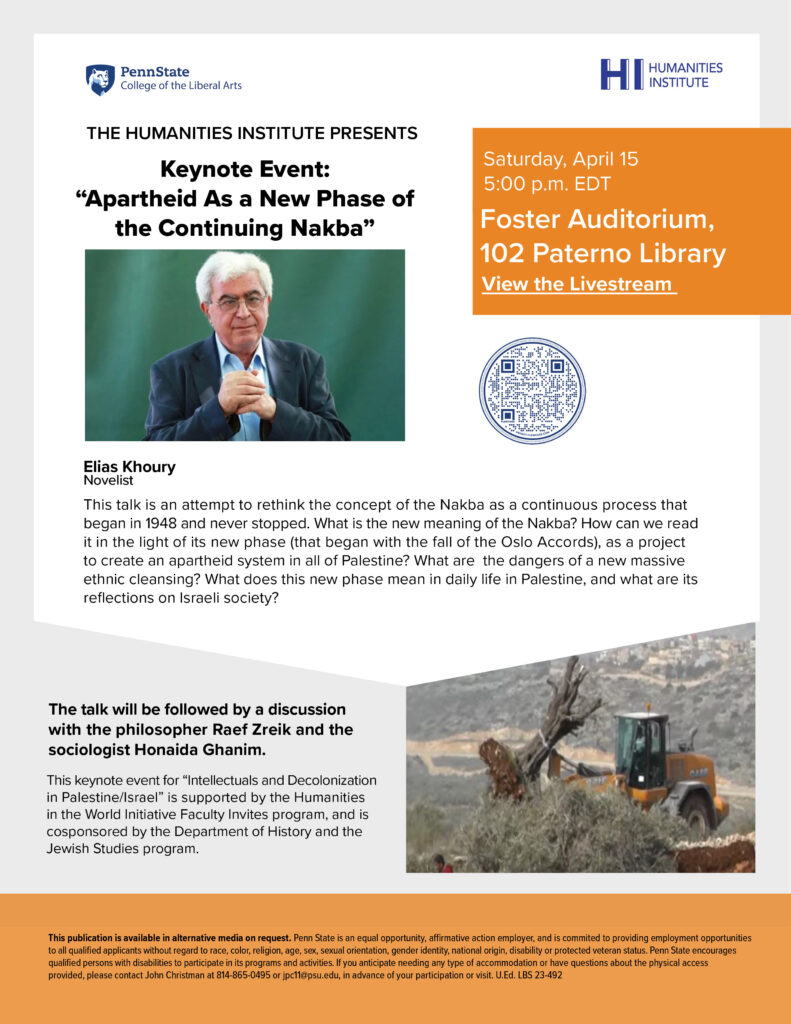
Monodrama:
“Never had a friend” with Micah Johnson, Assistant Professor of Mental Health Law & Policy, University of South Florida
Sunday, April 16, 5:00 p.m. Freeman Auditorium, HUB-Robeson Center
Dr. Micah E. Johnson performs a breathtaking memoir monologue entitled “Never Had a Friend.” The talk describes his experiences with homelessness as a child and how he learned the meaning of friendship and the value of artistic expressions. The piece features diverse types of performance art, including lecture, drama, comedy, poetry, and storytelling. Dr. Johnson delivers a captivating lesson on trauma, race, poverty, and the power of friendship to foster resilience. He hopes the talk will help foster support and compassion for disadvantaged children.
Dr. Micah E. Johnson is a sociologist trained in criminology and psychiatric epidemiology. He serves as an Assistant Professor in the Department of Mental Health Law and Policy at the University of South Florida. Dr. Johnson’s research centers around childhood trauma, behavioral health, and juvenile justice.
This performance will be followed by a discussion with Noura Erakat, Synthia Young, and Alex Lubin.
DOWNLOAD THE FLYER
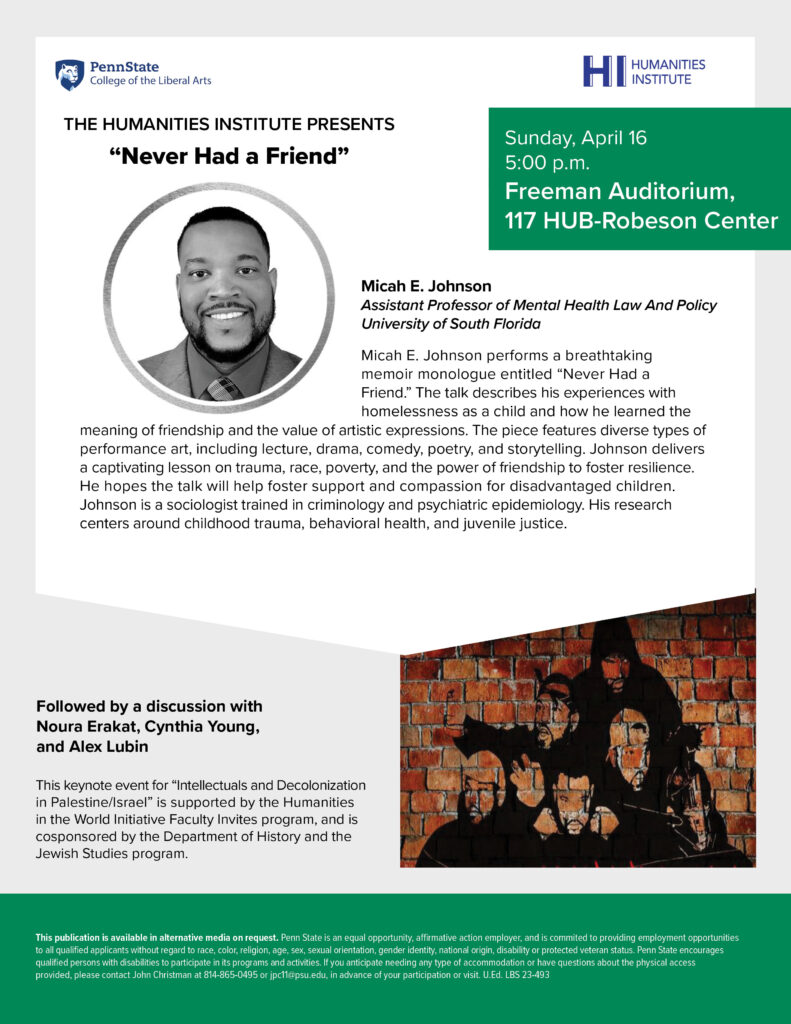
Reproductive Justice and the Harmful Afterlife of Colonial Reproductive Violence
October 31 – November 2, 2022
Organizer: Susanne Klausen (Department of Women’s, Gender, and Sexuality Studies)
Worldwide the effects of settler colonialism continue to be evident in reproductive discourses, practices, policies and laws that inflict violence on the bodies of indigenous peoples, people of color, and others who are deemed to fail to meet the oppressive ideal of the neo-liberal reproductive body. In addition to causing severe harm to vulnerable people, oppressive reproductive practices such as forced sterilization, denial of safe abortion, and environmental racism are ongoing effects of settler colonialism and colonial governance help sustain colonial structures and relations of power. Drawing on the intersectional framework of the global Reproductive Justice movement, this conference examines the continuities of colonial reproductive violence in the contemporary settler colonial state. Speakers will address aspects of reproductive injustice in Bolivia, Canada, Peru, South Africa, the United Kingdom and the United States.
This conference is sponsored by The Penn State Humanities Institute, Rock Ethics Institute, the Department of Women’s, Gender and Sexuality Studies (WGSS), the African Feminist Initiative (AFI), the Brill Professorship, and the Center for Global Studies (CGS).

Keynote talks:
“Biopolitical Control of Women’s Reproductive Bodies in Colonial Intimacies of Empire” with Amanda Gouws, South African Research Chair, Stellenbosch University.
October 31, 11:30 a.m. – 12:30 p.m.
“Reproductive Dispossession: A Long History from Slavery to Dobbs” with Jennifer Morgan, Professor of History, Department of Social and Cultural Analysis, New York University.
October 31, 5:30 – 6:30 p.m.
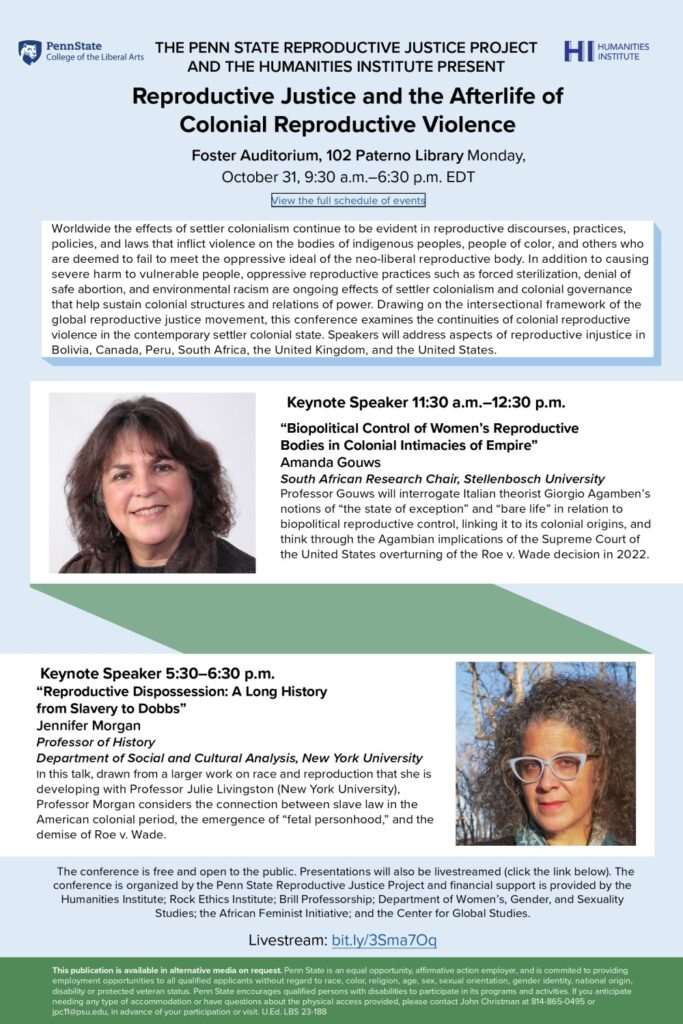
Collecting the Andes: Museums of Andean Art and Science in the Americas and Atlantic World
November 3-5, 2022
Organizers: Christopher Heaney (Department of History) and Amara Solari (Departments of Art History and Anthropology)
This three-day symposium brings together scholars and practitioners of art history, history, anthropology, archaeology, and museum design, from Argentina, Bolivia, Ecuador, Peru, and the United States to discuss the collection of Inca and Andean aesthetics, sciences, and natures in the Americas and Atlantic World, from the 1530s to the present. Its wide scope reflects its subject: the forms of Inca and Andean knowing and seeing whose colonial and post-colonial disruption, collection, and recreation shaped imperial and republican museums of anthropology, art, and natural history worldwide, as well as artistic and intellectual responses to colonialism in the Andes. This symposium helps shape a 2024 exhibit in the new Palmer Art Museum.
The three keynotes—listed below—are open to the Penn State community and State College public. We especially encourage the Penn State community to attend the Friday panels as well.
Visit the Conference Website to see the full schedule and learn more about this event.
This conference is sponsored by the Humanities in the World Initiative Faculty Invites program, and is co-sponsored by Department of History, Latin American Studies Program, and the Committee for Early Modern Studies.
Keynote talks:
“The Odyssey of a Royal Inca Tunic: Regalia, Heirloom, Art” with Andrew James Hamilton, Associate Curator of Arts of the Americas, Art Institute of Chicago.
Thursday, November 3, 5:00 p.m. Palmer Art Museum auditorium
An intricately patterned tunic in the collection of the Dumbarton Oaks Museum is the most famous work of Andean art in the world. However, little has been known of its life before it was acquired by Robert Woods Bliss, the founder of Dumbarton Oaks, in the 1950s. This talk explores how the 500-year-old tunic, originally destined for the wardrobe of an Inca emperor, may have journeyed to the walls of a museum. At the same time, it considers the consequences of its transformation as an object—from regalia, to heirloom, to art—for those who have cared for and about it.
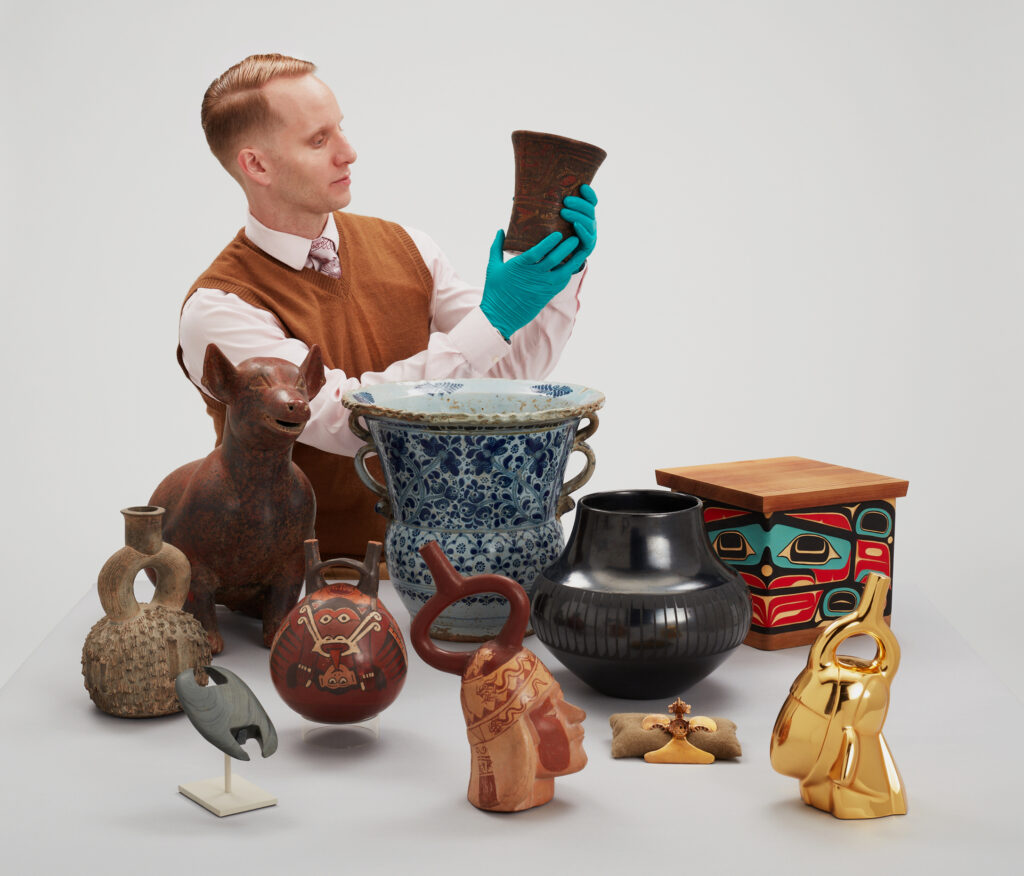
“In search of an aesthetic I can call my own” with Kukuli Velarde.
Friday, November 4, 12:00-1:30 p.m. Pasquerilla Spiritual Center, 130 Garden Room
Kukuli Velarde is a Peruvian artist based in the United States since 1987. Her practice revolves around the consequences of colonization, reclaiming a gaze both synchronous to our time yet rooted in pre-columbian and colonial sensibilities. She has received awards and grants such as the Guggenheim Fellowship (New York- 2015), the United States Artists-Knight fellowship (California- 2009), the Pew Fellowship in Visual Arts (Pennsylvania- 2003), the Anonymous is a Woman award (New York- 2000), the Joan Mitchell Foundation grant (New York- 1997), among others. In 2013 her project CORPUS got the Grand Prize at the Gyeonggi Ceramics Biennial in South Korea. She participated as faculty at the Skowhegan School of Painting and Sculpture in 2022.
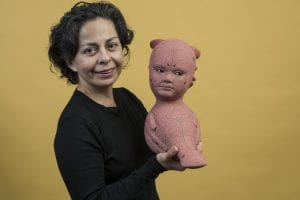
Keynote talks:
“The Odyssey of a Royal Inca Tunic: Regalia, Heirloom, Art” with Andrew James Hamilton, Associate Curator of Arts of the Americas, Art Institute of Chicago.
Thursday, November 3, 5:00 p.m. Palmer Art Museum auditorium
An intricately patterned tunic in the collection of the Dumbarton Oaks Museum is the most famous work of Andean art in the world. However, little has been known of its life before it was acquired by Robert Woods Bliss, the founder of Dumbarton Oaks, in the 1950s. This talk explores how the 500-year-old tunic, originally destined for the wardrobe of an Inca emperor, may have journeyed to the walls of a museum. At the same time, it considers the consequences of its transformation as an object—from regalia, to heirloom, to art—for those who have cared for and about it.

“Collecting the Ancestors: skeletons and mummies and their history in reconstructing health and medical practices in the pre-Hispanic Andes” with John Verano, Professor of Anthropology, Tulane University.
Friday, November 4, 5:30 p.m. Foster Auditorium, Paterno Library
Beginning in the nineteenth century, Peruvian, European and North American explorers and archaeologists collected human remains from burial caves in the highlands and cemeteries on the desert coast of the Andes. In Peru, collectors found skulls showing evidence of trepanation (skull surgery) in pre-Hispanic burial houses and caves. These medical practices were brought to world-wide attention by archaeologists like Julio Tello, a descendent of those medical ancestors in the central highlands, who devoted the rest of his life to excavating archaeological sites and building museum collections of ancestral mummies and skulls. This talk will look at how the study of human remains played an important role in documenting health conditions and medical practices in the pre-Hispanic Andes, and how these studies continue to flourish today through the work of a new generation of young bioarchaeologists.
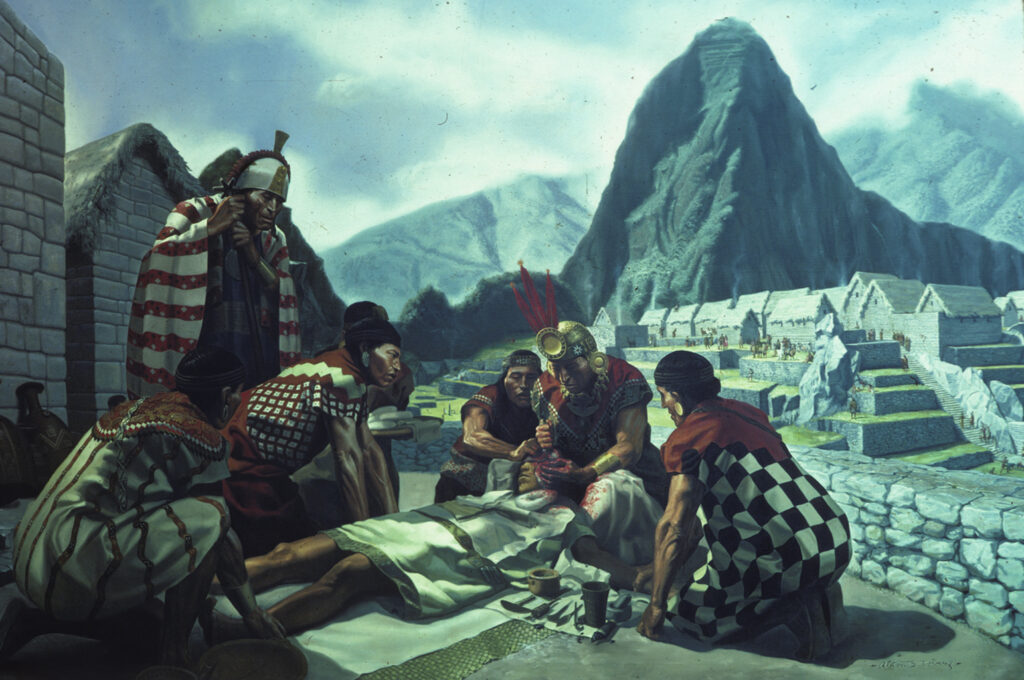
2021-2022
"Unknown Past: Layla Murad and the Jewish-Muslim Star of Egypt"
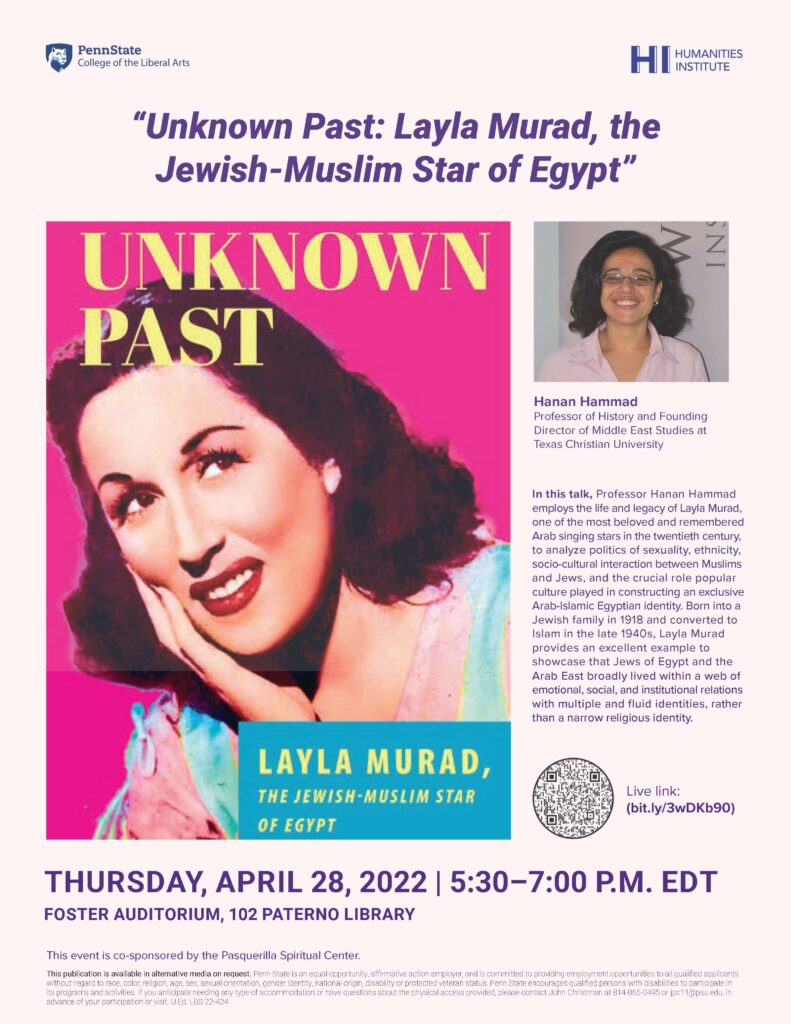
Other Events in 2022-2023
Public Humanities in the Classroom Workshop Series
Led by Public Humanities Postdoctoral Fellow Elizabeth Gray, the workshops introduced faculty and graduate students to forms of project-based learning, community engagement, and public partnerships. Participants developed a public humanities component to an existing course and left with a toolkit of approaches that can be applied in the classroom. If you missed the series, please contact us at humanities@psu.edu to access the recording.
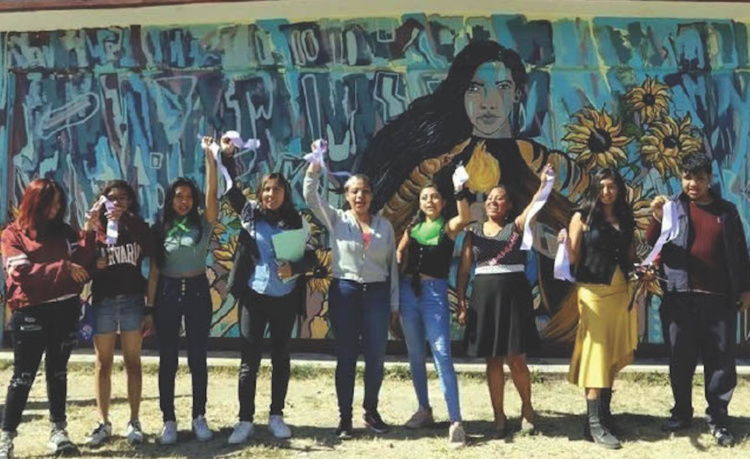
Carol Anderson
Dr. Carol Anderson of Emory University joined the McCourtney Institute for Democracy on Tuesday, September 21 at 4:00 p.m. for a lecture on her book One Person, No Vote at the State Theatre. In case you missed it, access the recorded lecture and the Q&A session here. Co-sponsored by the Africana Research Center, Humanities Institute, and Richards Center
2020-2021
Who Counts? Struggles for Representation and Recognition
In 2020, a year that held both an election and the 100th year celebration of Women’s Suffrage, the Humanities Institute organized events and other activities around the theme of “Who Counts? Struggles for Representation and Recognition.” Our series mobilized around the question of who counts?—both in the sense of “who gets counted?” as well as “who does the counting?”—focusing on the multiple dimensions along which social and political representation has been achieved (and denied), the historically precarious attainment of political voice for all citizens, and the complexities of suffrage for all members of the citizenry who may be given a vote but wonder if they are given a voice. The history of struggles for representation and recognition in America was the subject of the third episode of HI’s documentary series, HumIn Focus: Who Counts: The Complexities of Democracy in America. Centering on the troubled history and ongoing fragility of democracy in America, scholars in both the humanities and the social sciences were interviewed on the values inherent in democracy and the tenuous ways that institutions and practices in the U.S. have, and have not, lived up to those values.
“Reflections on the meaning of democracy in a post-election America.” Using Episode 3 as a springboard, coupled with the dramatic presidential election we witnessed in 2020, on December 10th HI Director John Christman talked with Dr. Cynthia Young, Head of the Department of African American Studies at Penn State about questions such as: What is the place of protest movements in a democracy, and the trajectory of protests against anti-black racism in this country and around the world? Repair institutional norms or push for radical solutions? What are the best next steps to restore and strengthen democracy? What is the threat to democracy from abiding dynamics of inequality, including imbalances of political representation, wealth, and power? What is the legacy of the fight for women’s suffrage and the ongoing effects of patriarchy? What is the role of mass- and social- media in fomenting or suppressing healthy democratic deliberation? To listen to the recording of this conversation, follow this link.
PLEASE NOTE: The following events were cancelled due to COVID-19.
In Spring 2020, Prof. Michael Ralph of NYU–whose work focuses on the connections between slavery, debt bondage and institutions like the insurance industry–was to talk on how such connections can cast light on the way that human beings get counted in social, political and economic registers.
Our Annual Humanities Lecture was to feature Prof. Qiana Whitted, Professor of English and African American Studies and Director of the African American Studies Program at the University of South Carolina. Her recent work focused on the ways that various social struggles and trauma, especially those involving civil rights, antisemitism, and other forms of prejudice in America, have been portrayed in comics and graphic literature.

2018-2019
HI Conference
The Humanities Institute hosts an Annual Conference as part of the Humanities in the World initiative and in partnership with faculty members through the Faculty Invites program. Conference topics may be in any area of humanities research, including interdisciplinary collaborations with other fields. Planning for upcoming conferences is currently underway.
International Colloquium on the Occasion of the Armistice Centenary, November 12 & 13, 2018
The first Annual Conference was held on November 12-13, 2018. Dislocation Beyond War’s End: International Colloquium on the Occasion of the Armistice Centenary was hosted by faculty members Sophie De Schaepdrijver (History) and Nicolas de Warren (Philosophy). Under the general rubric of dislocation and discontent, the aim of the conference was to explore the many ways in which the First World War failed to end in November 1918.

The Status of “Truth” in Public Discourse and Human Interaction
The question of what counts as “true” or “knowledge” in humanistic disciplines has always been a vexed one. Answers to questions about the human condition inevitably involve interpretation, fractured evidence, contested testimony, and the poetics of expression. At the same time, the realities of social life, the dynamics of political struggle, and the need to face up to our history, demand an acceptance of truth and facts in some form. How to embrace truth while taking seriously the multiple ways that social understanding is complex and evasive, is the central question that motivates this initiative.
What counts as “testimony” and “evidence” when large portions of the population are systematically silenced or downgraded in their status as truth-tellers? How do we understand the past in order to face it? What levels of “ignorance” are we willing to tolerate about violence, deprivation, and the state of the planet? Can we face the challenges of understanding our social world?
In 2017-2018 we wrestled with themes of witnessing and reporting, with the history and insidiousness of “fake news” within media, and with nuanced realities around sustainability practices. In 2018-2019 we will continue this series of events to question and discuss what counts as “true” in a social landscape that is marked by deep difference and chasms of misunderstanding.
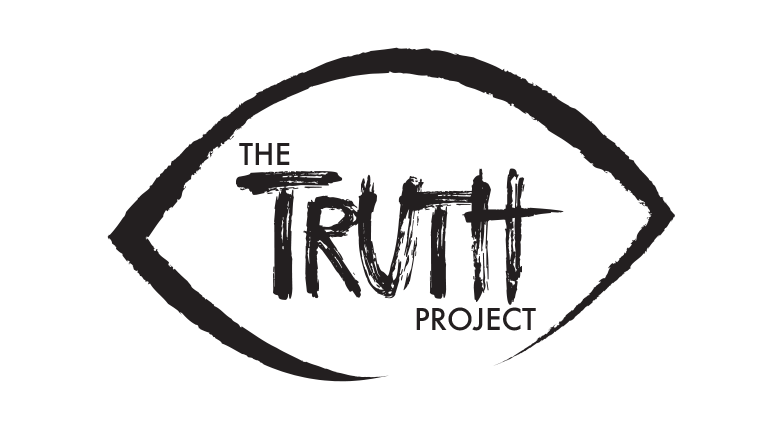
2018-2019 The Truth Project:
The Truth About Castes: Professor Divya Dwivedi of the Department of Humanities and Social Sciences at the Indian Institute of Technology, Delhi, asks if casteism is racism. She will challenge attempts by governments and academics to separate caste as it is still practiced today in South Asia from the broader contest of what elsewhere tends to be described in terms of race, ethnicity, and Volk. Join us on September 11th, at 4:00 p.m. in the Foster Auditorium (in Paterno Library)
2017-2018 The Truth Project:
The Witness: A film by James Solomon: ***Shortlisted for the 2016 Academy Award for Best Documentary Feature*** The name Kitty Genovese became synonymous with bystander apathy after The New York Times reported that 38 witnesses watched her being murdered – and did nothing to help. THE WITNESS, which premiered to critical-acclaim at the 2015 New York Film Festival, follows her brother Bill’s search for the truth. In the process, he unravels a myth that transformed his life, condemned a city, and defined an era. THE WITNESS debunks one of America’s most chilling crime stories as a brother reclaims his sister’s forgotten life from her infamous death. Join us for the Film Screening on October 19 at 7:00p.m. in 113 Carnegie. Join us for a discussion following the film, with faculty members Pearl Gluck (Assistant Professor of Film/Video) and Sarah Clark Miller (Associate Professor of Philosophy and Women’s Studies), moderated by HI Director, John Christman.
True Talk: Fake News: True Talk, Fake News: The Search for Truth in Public Discourse. This panel discussion brings together faculty members Rosa A. Eberly (Associate Professor of Rhetoric, Department of Communication Arts and Sciences & Department of English), Patrick Plaisance (Don W. Davis Professor of Ethics, Department of Journalism) Russell Frank (Associate Professor, Department of Journalism), and Matt Jordan (Associate Professor, Department of Film/Video and Media Studies). Join us for the Panel Discussion on November 9th at 4:30 p.m. in the Foster Auditorium (102 Paterno Library).
Sustain What? Wrestling with the “Truths” of Sustainability and Climate Science: When the term “sustainability” refers to so many complex aspects of our social and environmental life–including sustaining ecosystems, land and water formations, human communities, and ways of life–what do we really mean when we say, “sustainability”? Panelists include Bryan McDonald (Sherwin Early Career Professor in the Rock Ethics Institute and Associate Professor of History), Erica Smithwick (Associate Professor of Geography and Director, Ecology Institute), and Courtney Morris (Assistant Professor of African American Studies and Women’s, Gender, and Sexuality Studies). The Panel will be moderated by Peter Buckland, Penn State Sustainability Institute. Join us for the Panel Discussion on April 4th at 4:00 p.m. in 101 Chambers Building.
